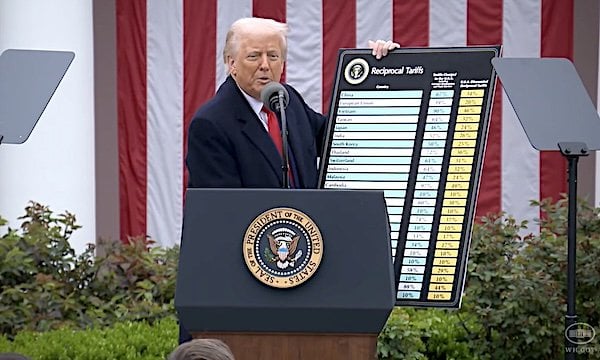President Donald Trump’s agenda to use tariffs to push for fair trade deals, raise revenue for America and support U.S.-based business and industry sparked the first monthly trade surplus in years. In happened when the surplus was reported at $27 billion, just weeks ago.
And the longer term impact appears to be even brighter.
A report at the Washington Examiner detailed a new projection from the Congressional Budget Office, the nonpartisan organization that keeps its thumb on America’s wallet.
That group is predicting Trump’s tariff agenda, if maintained, would “decrease total deficits by up to $4 trillion over the next decade.”
“CBO projects further increases in tariff revenues in the coming months,” director Phillip Swagel wrote. “If there are no further changes in tariff rates, we project that customs duties from new and existing tariffs will total about $200 billion this fiscal year.”
The nation has a total debt now of about $37 trillion, with each citizen’s share more than $108,000.
The forecasts come in light of the adoption over the summer of Trump’s One Big Beautiful Bill that established a secure future for the Trump tax cuts of his first term. It also addresses a long list of other government actions, including massive cuts in spend in several areas.
It calls for an elimination of tax funding to the abortion industry giant Planned Parenthood, which has gone to court claiming it can, through the courts, force taxpayers to deliver cash to its accounts even though Congress and the president have determined that should not be spent.
Oddly, there are now entry-level court judges who have agreed with this concept of a constitutional right for abortionists to tax money.
The CBO estimates the OBBBA will represent a $4.5 trillion decrease in tax revenues and a $1.1 trillion cut in spending through 2034.
But White House officials are counting on economic growth as well as hundreds of billions in new tariff revenue to help the nation.
The Council of Economic Advisers earlier suggested the legislation that came to be the OBBBA would produce a deficit reduction of up to $2.3 trillion over a decade, from growth.
Click this link for the original source of this article.
Author: Bob Unruh
This content is courtesy of, and owned and copyrighted by, https://www.wnd.com and its author. This content is made available by use of the public RSS feed offered by the host site and is used for educational purposes only. If you are the author or represent the host site and would like this content removed now and in the future, please contact USSANews.com using the email address in the Contact page found in the website menu.





